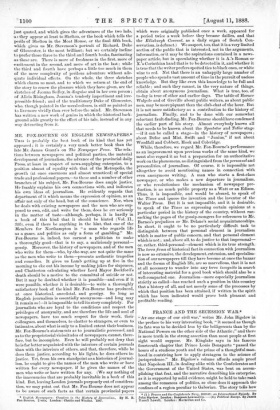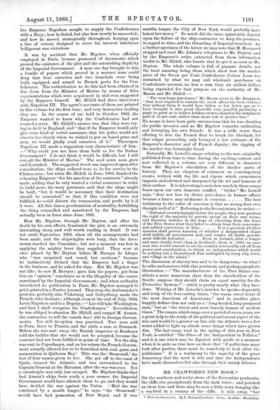FRANCE AND THE SECESSION WAIL*
" AT one stage of our civil war," writes Mr. John Bigelow in the preface to his very interesting book, " it seemed as though its fate was to be decided less by the belligerents than by the National Powers on the other side of the Atlantic ;" and there is more truth in the strong assertion than most people at first sight would suppose. Mr. Kinglake says in his famous fourteenth chapter that Prince Louis Bonaparte "passed the hours of a studious youth and the prime of a thoughtful man- hood in contriving how to apply stratagem to the science of jurisprudence." Mr. Bigelow's volume affords ample proof that Napoleon III., in dealing alike with the Confederates and the Government of the United States, was bent on accom- plishing that feat, and the narrative describing his enterprise, as it is supported by solid evidence, might be held to take rank among the romances of politics, so close does it approach the confines of a region peculiar to Gaboriau. The story tells how • (1 ) Prance and the Confederate Navy. 188&88: an International Episode. By John Bigelow. London : Sampson LowandCo.—(2.) Political Essays. By James Russell Lowell. London : Macmillan and Co. the Emperor Napoleon sought to supply the Confederates with a Navy ; how he failed, but also how nearly he succeeded ; and how he moved strategically throughout, keeping open a line of retreat designed to serve his interest whichever belligerent was victorious.
It was by accident that Mr. Bigelow, when officially employed in Paris, became possessed of documents which proved the existence of the plot and the astonishing duplicity of the Imperial Government. A man one day brought to him a bundle of papers which proved in a manner none could deny that four corvettes and two ironclads were being built, equipped, and armed in French ports for the Con- federates. The authorisation to do this had been obtained in due form from the Minister of Marine by means of false representations which were acquiesced in and even suggested by the Emperor himself. Mr. Slidell had three interviews with Napoleon III. The agent's accounts of them are printed in this volume for the first time ; and very instructive reading they are. In the course of one held in October, 1862, the Emperor wanted to know why the Confederates had not created a navy. Mr. Slidell's answer was that they were try- ing to do it in England, and " that if the Emperor would only give some kind of verbal assurance that his police would not obser•re too closely when we wished to put on board guns and men, we would gladly avail ourselves of it." Thereupon Napoleon III. made a suggestion very characteristic of him : —" Why could you not have them built as for the Italian Government? I do not think it would be difficult, but I will consult the Minister of Marine." The seed sown soon grew and flourished. The suggested deceit was improved upon after consultation ; the ships ordered were to he for service in the Chinese seas ; but when Mr. Slidell, in June, 1863, thanked the scheming Emperor "for his sanction of the contracts "already made, adding that he only wanted a verbal assurance in order to build more, the wary potentate said that the ships might be built, " but it would be necessary that their destination should be concealed," so that, if this condition were not fulfilled, he could disown the transaction, and profit by it if it were. All this time a proclamation of neutrality, forbidding the thing counselled and sanctioned by the Emperor, had actually been in force since June, 1861.
How Mr. Bigelow, through Mr. Dayton, and after his death by his own efforts, frustrated the plot, is an extremely interesting story, and well worth reading in detail. It was not until September, 1863, when all the arrangements had been made, and the shipwrights were busy, that the docu- ments reached the Consulate ; but not a moment was lost in applying the mighty lever they supplied. They were at once placed by Mr. Dayton before M. Drouyn de Lhuys, who " was surprised and vexed, but cautious," because he instinctively divined that the Emperor had a finger in the business, and he asked for time. But Mr. Bigelow was not idle ; he saw M. Berryer ; gave him the papers ; got from him an " opinion" conclusive as to the illegality of the course sanctioned by the Imperial Government; and when authority interdicted its publication in Paris, Mr. Bigelow managed to get it printed in a Nantes journal. That step, the Ambassador's protests, probably also Vicksburg and Gettysburg. made the French ruler hesitate; although even at the end of July, 1864, Louis Napoleon said to a Deputy,—" Lee will take Washington, and then I shall recognise the Confederates." Nevertheless, he was obliged to abandon Mr. Slidell, and compel M. Annan, the contractor, to sell the vessels bond fide to foreign Govern- ments. Yet still deception was practised. Two were sold to Peru, three to Prussia, and the sixth, a ram, to Denmark. Before she was sent away, the Danish inspector at Bordeaux told the builder that she would not be accepted, because the contract had not been fulfilled in point of time. Yet the ship was sent to Copenhagen, and on her return the French Govern- ment actually allowed her to be furnished with coal, guns, and ammunition in Quiberon Bay ! This was the ' Stonewall,' the last of four names given to her. She got off to the coast of Spain, crossed the Atlantic, and was surrendered to the Captain-General at the Havanna, after the war was over. Yet a catastrophe was only just escaped. Mr. Bigelow thinks that had Arman's ships been ready a year sooner, the Imperial Government would have allowed them to go, and they would have decided the war against the Union. " Had the war continued by a month longer," he says, " the ' Stonewall ' would have had possession of Port Royal, and if two months longer, the City of New York would probably have lain at her mercy." So much did the issue, apparently, depend upon the failure of the ship-contractor to keep his promises, in regard to time, and the thwarting of Imperial treachery. As a further specimen of the latter, we may note that M. Mocquard stopped and read Mr. Adams's telegrams to Mr, Dayton, and by the Emperor's order, extracted from them information useful to Mr. Slidell, who boasts that he got it as soon as Mr. Dayton. The whole volume is full of piquant details, not the least amusing being those which show how the market price of the Seven per Cent. Confederate Cotton Loan was sustained by what we may call wholesale purchases ou Confederate account, no less a sum than six million dollars being expended for that purpose on the authority of Mr. Mason and Mr. Slidell :- " The very large purchases," Mr. Mason wrote to Mr. Benjamin,
"that were required to sustain the stock afford the best evidence that without them it would have fallen so low below par as to have brought it into great discredit, very possibly producing a panic so great as to induce holders even to abandon the instalment paid of 15 per cent. rather than incur risk of greater loss."
He seems to have been quite unconscious that he was cheating the public investor, and, as Mr. Bigelow remarks, misleading and betraying his own friends. It was a trifle worse than offering to hire the French fleet to break the blockade, for that vulgar proceeding only betrayed a low estimate of the Emperor's character and of French dignity ; the rigging of the market was downright fraud.
Naturally, Mr. Lowell's essays relating to the war, originally published from time to time during the exciting contest, and now collected in a volume, are very different in character from Mr. Bigelow's elucidation of the shadier parts of history. They are chapters of comment on contemporary events, written with the life and vigour which earnestness imparts, and adorned and sharpened by the wit and humour of their author. It is interesting to note how much in these essays bears upon our own domestic conflict. " Order," Mr. Lowell says, " does not lose its divine precedence in human affairs because a knave may nickname it coercion The best testimony to the value of coercion is that no wrong-doer ever thought well of it." Referring to the Secessionists, he writes :— " Defeated overwhelmingly before the people, they now question the right of the majority to govern, except on their own terms, and threaten violence in the hope of extorting from the fears of the Free States what they failed to obtain from their conscience
and settled convictions of duty It is a question whether America shall govern America, or whether a disappointed clique shall nullify all government now, and render all stable govern- ment difficult hereafter Even in Ireland, after a longer and more deadly feud [than in Scotland], there is [1861] no sane man who would consent to see his country irrevocably cut off from power and consideration, to obtain an independence which would be nothing but a Donnybrook Fair multiplied by every city, town, and village in the island."
The discussion of slavery was said to be dangerous,—to what ? he asks, and answers with this pertinent, and perhaps prophetic illustration :—" The manufacturers of the Free States con- stitute a more numerous class than the slaveholders of the South : suppose they should claim an equal sanctity for the Protective System ?"—which is pretty nearly what they have done. Writing of Mr. Lincoln's murder, he speaks eloquently and truly of the forecasting brain, " the warm, sweet heart of the most American of Americans ;" and in another place happily defines him not only as a " long-headed, long-purposed man," but as " the wisest and most bravely human of modern times." The essays, which range over a period of seven years, are a great help to the study of the political and moral aspect of the war, and would be a greater on this side the Atlantic were a few notes added to light up afresh some things which have grown dim. The last essay, read in the spring of this year in New York, is entitled " The Place of the Independent in Politics," and it is one which may be digested with profit at a moment when it is quite as true here as there that " if politicians must look after parties, there must be somebody to look after the politicians." It is a testimony to the sagacity of the great democracy that the need is felt, and that the Independents have made themselves felt also through their manly labours.



































 Previous page
Previous page